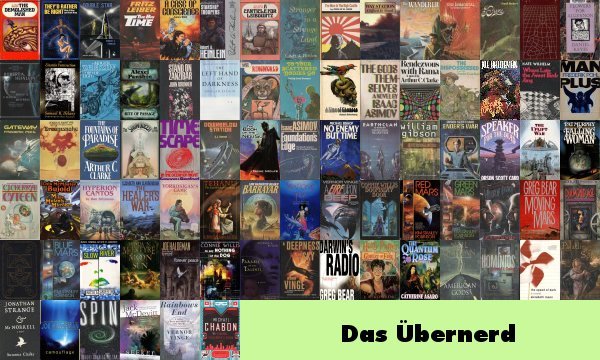 Bob Eggleton
Bob Eggleton1997 Hugo Winner for Best Professional Artist
The images I've been taking for Eggleton's awards are his Chelsey Award winners taken from The Chesley Awards for Science Ficiton and Fantasy Art. This painting was his 1997 winner of course.
The short stories this time are especially odd selections with "Bicycle Repairmen" being the only "normal" story in the bunch.
"Blood of the Dragon"
by George R. R. Martin
1997 Hugo Winner for Best Novella
I'm a bit disappointed that A Game of Thrones didn't make the final nomination for the novel ballot since it would have been the first time in Hugo history where the same text was nominated in two different categories. "Blood of the Dragon" is essentially an early form of the Daenrys chapters of A Game of Thrones and while it is an interesting setting I don't think it works very well as a stand alone novella and is certainly not worth checking out in preference to the book.
Daenrys is a princess in exile whose mother fled her kingdom before she was born. Her brother is a mentally unstable, sadistic monster who is determined to take back the kingdom despite the fact that he is powerless, penniless, and no one there would want him. His current plan is to sell his sister to a Mongol hoard stand in as part of buying an army. Despite being a pawn Daenrys finds a place in that cruel society.
If you haven't read A Game of Thrones then I give it half a recommendation. I have no taste for epic fantasy but Martin cast things in a more brutal, genuinely medieval light and part of that shows through in "Blood of the Dragon". Daenrys has a brutal life and Martin doesn't pull his punches with it. Of course the problem is that the series has become one of those indefinitely stretched out series where less and less happens in each book so that there will be another book to sell later. I'm invested enough to be suckered into the eventual fifth book (with the series currently projected at eight(!) which is up from the original three that were announced) but I'm hesitent to recommend it just because there is no ending in sight.
If you have read A Game of Thrones then "Blood of the Dragon" is an interesting curiosity since several scenes are different from the book but there's not enough different to justify going through a lot of effort for it.
So despite being a decent story I can't recommend "Blood of the Dragon"; either get the book that it's an excerpt from or give it a pass.
"Bicycle Repairman"
by Bruce Sterling
1997 Hugo Winner for Best Novelette
A bicycle repairmen in a burned out slum in the near future receives a mysterious bit of technology. A strange woman turns up and breaks into his shop to recover it but he catches her. She's a government agent and so he has to decide what to do with her.
I didn't think much of this story. There's a lot of setting detail but it doesn't really amount to much. Just about all of the dialog is exposition; just about all of the plot is told rather than shown and I'm not entirely clear on anyone's motivations. The government agent explains (poorly) why they're doing what they're doing but why anyone else does anything is generally fuzzy to me.
In fact so little happens worth mentioning in this story that I don't really have much more to add to my review. The characters are for the most part impenetrable ciphers, the plot is ephemeral fluff, and there's no theme or structure holding it together. I can only guess that the story exists for the purpose of presenting the setting but it didn't matter to me. For this reason I don't recommend this story.
"The Soul Selects Her Own Society: Invasion and Repulsion: A Chronological Reinterpretation of Two of Emily Dickinson's Poems: A Wellsian Perspective"
by Connie Willis
1997 Hugo Winner for Best Short Story
I would have hated to be the guy who had to engrave that title on the Hugo.
To know if this is a story worth reading for you look at this sentence from early on in it where the author discusses how they identified a poem fragment as belonging to Emily Dickinson:
"...but the large number dashes makes it clear they were written by Dickinson, as well as the fact that the poems are almost totally indecipherable."
How did you react:
A. "Ha ha, 'large number of dashes'!"
B. "Ha ha, 'indecipherable'!"
C. I don't get it.
If you answered A then you need to seek out this story, B indicates you'd probably enjoy it but not as much, and C means this is not for you.
The "story" is actually an "academic" paper where the author attempts to prove that two poem fragments are a result of Dickenson repulsing H. G. Wells's Martians at the turn of the twentieth century. Yes, she was dead for fourteen years at that point but the author doesn't let that get in the way of their thesis. The story is a wonderful send up of Dickenson and literature acadamia but it only really works if you're familiar with both. I loved it but then I'm weird that way.
